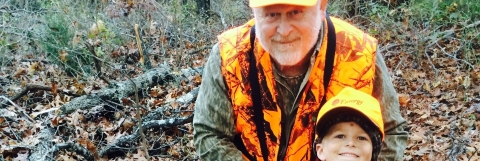For millions of American families, the hunting conservation ethic is a way of life to be passed on proudly through generations. The Johnsons of Minnesota and the DeSpains of Arkansas are two such families.
The Johnsons and the DeSpains understand what conservation pioneer Aldo Leopold meant when he wrote long ago: “A peculiar virtue in wildlife ethics is that the hunter ordinarily has no gallery to applaud or disapprove of his conduct. Whatever his acts, they are dictated by his own conscience, rather than by a mob of onlookers. It is difficult to exaggerate the importance of this fact.”
They know that the hunting ethic involves respect – for nature, for the land, for wildlife and for other people. They know it requires patience, not instant gratification. They know it encompasses the seven principles of the North American Conservation Model.
The Johnsons
Jenny and David Johnson and their daughters hunt waterfowl and deer in the upper Midwest, near Fergus Falls Wetland Management District in Minnesota. The wetland management district wetland management district
A wetland management district is a U.S. Fish and Wildlife Service office that manages waterfowl production areas in one or more counties. Waterfowl production areas are small natural wetlands and grasslands that provide breeding, resting and nesting habitat for waterfowl, shorebirds, grassland birds and other wildlife. The Fish and Wildlife Service acquires waterfowl production areas under the authority of the Migratory Bird Hunting and Conservation Stamp Act, primarily using funds from the sale of Federal Duck Stamps. The Refuge System’s 38 wetland management districts comprise thousands of waterfowl production areas – almost all in the Prairie Pothole Region of the Northern Great Plains.
Learn more about wetland management district is home to the Prairie Wetlands Learning Center and its annual Woodie Camp for teenage hunters. “I think it is important because hunters are great conservationists,” says Jenny. “I want to teach them love and respect for the world around us, not just seeing it through the eyes of social media but to see it firsthand. Being out there firsthand and experiencing the hunt gives them the kind of love and respect that is hard to learn otherwise.”
For David Johnson, hunting “has changed from getting the ‘big trophy’ to watching my children grow to love the sport. My success in the hunt is based on their success.”
The DeSpains
Five generations of DeSpains have hunted white-tailed deer, duck, dove, turkey and other game at and near Big Lake National Wildlife Refuge in Arkansas. James “Bull” DeSpain taught his son, Will, to hunt decades ago. Both are passing along the skill – and the ethic – to Will’s children. Hunting instills in young people “a respect for nature – a respect for what is out there in the woods,” Bull DeSpain says.
Hunting teaches gun safety, says Will DeSpain. “It makes you responsible. It’s not easy … You may hunt two or three weekends and not even see a deer … It takes patience and respect for the outdoors. Dad always told me to not litter and do things right. And we always had to leave it better than it was when we went out there.”







